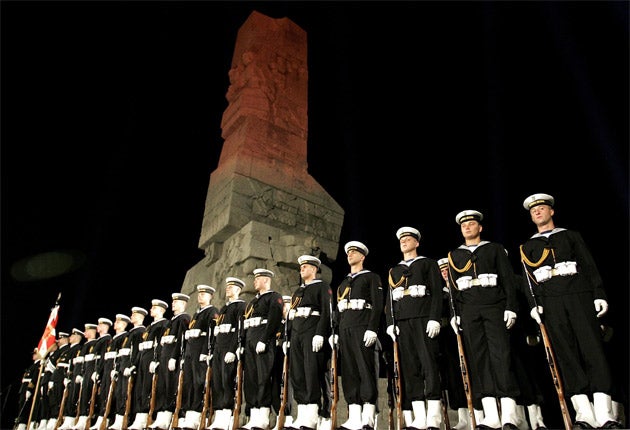Russia and Poland clash over who was to blame for the war

World leaders and war veterans gathered in the Polish city of Gdansk yesterday to mark 70 years since the outbreak of the Second World War.
But while European leaders were mourning the destruction of Poland following the invasion of both Nazi and Soviet armies, Russia used the occasion to deny any responsibility for starting the war and to accuse Poland of harbouring secret plans in the 1930s to destroy the Soviet Union.
"Westerplatte is a symbol, a symbol of the heroic fight of the weaker against the stronger," the Polish President, Lech Kaczynski, said. "It is proof of patriotism and an unbreakable spirit. Glory to the heroes of those days, glory to the heroes of Westerplatte, glory to all the soldiers who fought in World War Two against German Nazism, and Bolshevik totalitarianism."
It was here, on a small peninsula north of Gdansk, that the first shots of the Second World War were fired 70 years ago. The Russian Prime Minister, Vladimir Putin, however, had certainly not come to Poland to give glory to those who fought against Bolshevik totalitarianism, and accused Poland and other central European countries of distorting history by laying any blame for what happened during the war at Moscow's doorstep.
"If we are going to speak objectively about history, we must understand it does not have just one colour. It was diverse and a huge number of mistakes were made by all sides," said Mr Putin, during a joint news conference with the Polish Prime Minister, Donald Tusk. Both leaders promised to turn over a new leaf in relations and set aside the thorny issue of historical truth, but the conference was tense at times, with both politicians playing to their domestic audiences.
Mr Putin dodged a question about the Katyn massacre in 1940, when nearly 22,000 Poles were executed by Soviet forces. A Polish journalist asked when historians would be able to review archive evidence relating to the event, to which Mr Putin instead replied with an accusation about Polish crimes during the war. However, Mr Tusk later said that the two leaders had agreed that a joint Polish-Russian commission of historians would be set up to investigate what happened at Katyn.
In Moscow, Russia used the anniversary to release a set of documents from its intelligence archives, which it says shows that Poland was partly to blame for the outbreak of war. The documents allegedly show both that Poland was keen to enter into an alliance with Nazi Germany during the 1930s, and that the Poles had a secret intelligence division aimed at destabilising and destroying the Soviet Union.
"The destruction of Poland as a sovereign nation by the Nazis was payback for the short-sightedness of some Polish politicians," said Lev Sotskov, a major-general of the SVR, Russia's elite foreign intelligence agency. "Without a doubt, some of the guilt for the start of the Second World War lies with Poland, which is why they are now trying to falsify historical facts."
The comments of German Chancellor Angela Merkel, who was also at the ceremony in Gdansk, highlighted the different attitudes that Germany and Russia take towards their totalitarian pasts. She told a German television station that the country would never forget the "causes and effects" of the war. "Germany triggered the Second World War," she said. "We brought endless suffering to the world."
Join our commenting forum
Join thought-provoking conversations, follow other Independent readers and see their replies
Comments